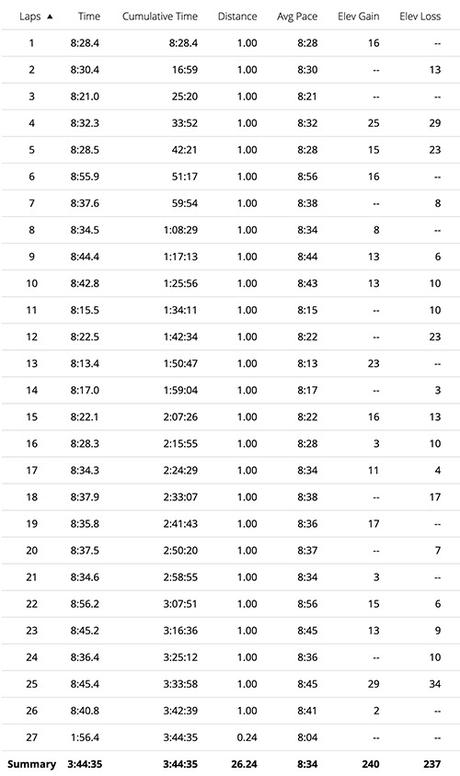In the middle of Huntington, West Virginia there’s a river. Next to this river there is a steel mill. And next to the steel mill there is a school. In the middle of the school, there is a fountain. Each year on the exact same day, at the exact same hour, the water to this fountain is turned off. And in this moment once every year, throughout the town, throughout the school, time stands still.
– “We Are Marshall”
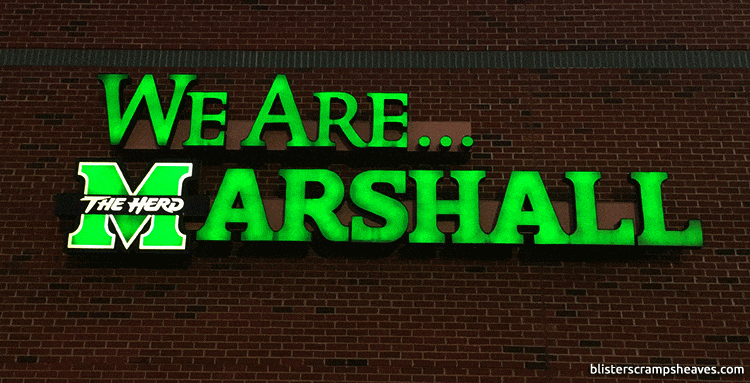
As I’ve noted before, the 50 States quest is both a beast of opportunity and a three-dimensional game of real-world Tetris. And at no time has this truth been truer than last autumn.
With Katie planning to join several friends in Arizona for a landmark birthday celebration (not hers) in early November, I suddenly found myself with a wide-open chance to color in another state on my 50 States Map, if I could find a viable candidate. So I hopped on RaceRaves and quickly discovered the Marshall University Marathon (MUM) in Huntington, WV, which fell on that same weekend in a state I’d yet to visit.
Except technically that wasn’t true. We had in fact visited West Virginia three years earlier, when we’d first flown into Louisville, Kentucky to attend Muhammad Ali’s funeral procession before crossing the state to run the Hatfield McCoy Marathon. A two-state superstar, the Hatfield McCoy course had started in Kentucky and finished in West Virginia, meaning I could legitimately count it for either state.
To this point I’d considered Hatfield McCoy my entry for the Bluegrass State, since that weekend had been Kentucky-centric and our brief foray across the border hadn’t done its neighbor state justice. But I’d always reserved the right to change my mind and count HMM for West Virginia depending on how my future Tetris pieces fell into place. (Keeping those options open!) Now I had the opportunity to formally check off West Virginia, without Katie feeling like she’d miss out on visiting a new state.
And that, kids, is what we call a win-win.
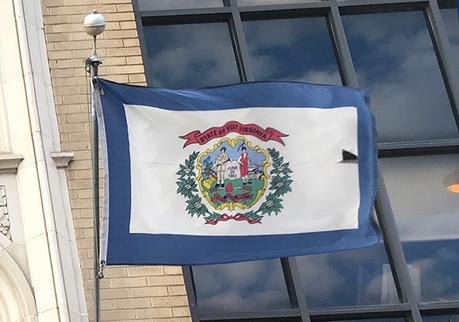
Also working in its favor, MUM is the runner-up to Hatfield McCoy among Mountain State marathons, at least according to our RaceRaves Runners Choice: Best of the US Marathons poll in which we’d surveyed runners across the country as to their favorite marathons in all 50 states. Plus, any semi-regular reader of this blog knows I’m a sucker for college campuses.
Quickly I did some online research and discovered that YES, it was in fact possible to get to Huntington without having to fly into Columbus, Ohio and drive 150 miles. So I pulled the trigger and reserved a not-inconvenient flight to Huntington with a brief layover in Charlotte, North Carolina. As I’d later learn the hard way, I probably should have added a rental car to that reservation…
In search of an intrepid companion to join me in the Mountain State, I reached out to fellow 50 Stater and recent new dad Dan Solera, whose own 50 States journey lacks only Alaska, Hawaii and… West Virginia. Despite the new responsibilities of fatherhood, I hoped this would be a quick and easy opportunity for him to close out the continental US. Unfortunately he already had plans to be in Miami with family that same weekend, which also happened to fall a few days before his birthday. So then for the first time in 29 states, I’d be traveling and running alone. Sólo yo.
And just like that, a girls’ (plural) weekend for Katie turned into a boy’s (singular) weekend for me.
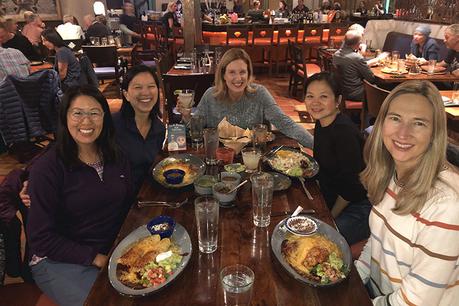
A Mountain State of mind
Our flight from Charlotte touched down in Huntington on Friday night under cover of darkness. Emerging into the main concourse of Huntington Tri-State Airport at just before 9:30pm local time, I had the distinct impression I’d be tasked with turning off the lights on my way out. As I waited 16 minutes for the closest Lyft driver to arrive (36 minutes for the nearest Uber driver), the last of my fellow passengers departed the airport, and briefly I stepped outside into the bone-chilling cold before retreating back into the warmth of my own private terminal.
Toto, we’re not in Los Angeles anymore.
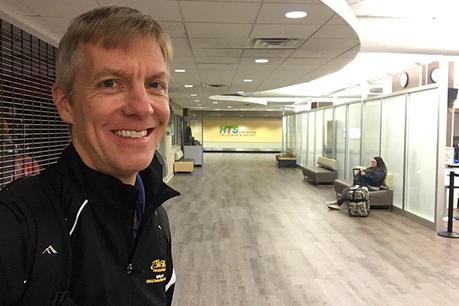
On that note, my Lyft driver from the airport dispelled any lingering doubt, assuring me when questioned that there was “not much to do here.” To a man (or woman), each driver throughout the weekend was surprised to hear I’d come all the way from California, and my go-to response to the frequent question of “What are you doing out here?” quickly became “Trying to escape the wildfires.” (My first two drivers clearly were not runners and had no idea Huntington hosted a marathon, so that wasn‘t much of a conversation starter.)
On Saturday I caught up on my sleep before rolling down into Huntington for the quiet, uneventful expo at the New Baptist Church, where a fleet of cars displaying “FUNERAL” placards sat parked in front of the main entrance. To one side an inflatable Marshall University Marathon arch signaled the door to the expo, which was sparsely decorated with a MUM backdrop and wooden bison in tribute to the school’s mascot, the Thundering Herd. Given the event’s name and affiliation I had to wonder, why couldn’t this expo have been held somewhere more inviting, say on the Marshall campus closer to the center of town?
With race packet in hand I grabbed a quick Thai lunch in Pullman Square before setting out to explore Huntington on foot. From Harris Riverfront Park on the banks of the Ohio River, to the statue of railroad magnate Collis Huntington for whom the city was named, to the Marshall University campus, I soon realized West Virginia’s second-largest city was a bit more spread out than I’d anticipated. And though very few coaches — or at least very few good coaches — would recommend walking several miles the day before a marathon, I wasn’t here to set a personal best or qualify for Boston. Besides, the chance to discover (and document) new places like Huntington is the real driver of this 50 States quest.
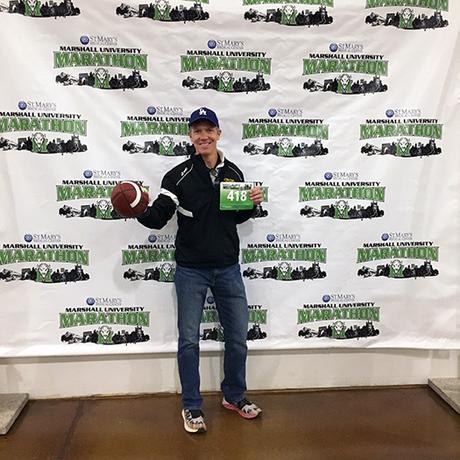
Admittedly, what I saw on my whirlwind tour of Huntington reinforced many preconceived notions of urban Appalachia, minus the banjos and overalls. Cracked roads and vacant lots were in no short supply along with billboards advertising addiction treatment and recovery services; after all, based on the most recent data from the CDC, West Virginia is the epicenter of the nation’s opioid epidemic with the highest rate of death due to drug overdose. One older Lyft driver, who claimed Huntington as both his birthplace and post-retirement home, noted of the St. Mary’s Medical Center as we passed, “They keep busy treating the usual illnesses: addiction, obesity, toothlessness.” He chuckled as he said the latter, as though tickled by this unflattering stereotype of his fellow Huntingtonians.
(Notably, I did pass quite a few family dentistry practices during my afternoon stroll, second only to churches and auto repair shops.)
That evening I dined on Mexican fare before Lyfting back to my room at the Fairfield Inn & Suites Huntington. Located atop a hill nearly four miles from the marathon start line, the Fairfield Inn & Suites had been the most convenient option available by the time I’d booked my lodging a month before race day. Normally four miles would be an easy car ride, but given Huntington’s sporadic rideshare services, I was genuinely concerned about getting to the start line Sunday morning on time. Luckily the racing gods would smile down on me not once but twice: first, an extra hour of sleep awaited me thanks to the end of daylight saving time, which would allow me to rise and shine in plenty of time to find my way to the start line. So even if my iPhone failed to adjust appropriately to the early morning time change, I’d still wake up an hour early. And second… well, I’ll get to second in a moment.
With so many marathons and ultramarathons under my belt, nowadays I rarely have trouble sleeping on the night before a race. That night in Huntington, though, I awoke in a moment of anxiety thinking, “Wait, West Virginia does recognize daylight saving time, doesn’t it?” Squinting at my phone I saw that the display read 1:58am… so I watched until the clock turned to 2:00am EDT and then immediately back to 1:00am EST, before falling easily into a deep and worry-free sleep.
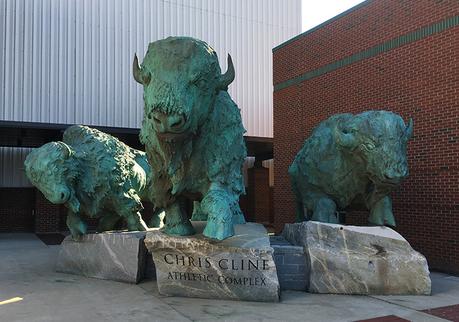
MUM’s the word
On Sunday I awoke to chilly temperatures and my second high five from the racing gods. The previous evening, I’d asked Dan my Lyft driver if he knew how to schedule a ride ahead of time, since for some reason the app wouldn’t cooperate here in Huntington. And though he was unable to answer my question, Dan’s solution — and I still can’t believe this — was to wake up Sunday morning and turn on his own app, just in case I needed a ride. Now here he was, and as if that weren’t enough, he’d driven in from the next county to be here. Who does that? An incredibly kindhearted fellow with the license plate “LYFT1,” that’s who. Needless to say I tipped him generously, but it’s tough to put a price on such an exquisite and unsolicited act of kindness.
Minutes later, I thanked Dan once again and hopped out on 5th Avenue a short walk from the start line. Directly across the street, several volunteers assembled one of the day’s aid stations in the waning darkness. There I dropped off my bottle of Maurten sports drink for retrieval on the second loop of MUM’s two-loop course, somewhere between mile 14 and 16 (the course map hadn’t been precise). Katie would be proud, I thought of this uncharacteristic planning on my part — planning which, ironically enough, was only necessary because meeting me between miles 14–16 with my bottle was exactly what Katie would normally do.
Then I headed toward the start line, stopping briefly to experience the rare, ineffable joy of christening the first in a line of pristine porta-potties which stood far from the madding crowd in the shadow of Joan C. Edwards Stadium. (If you’re not a runner, trust me on this.)
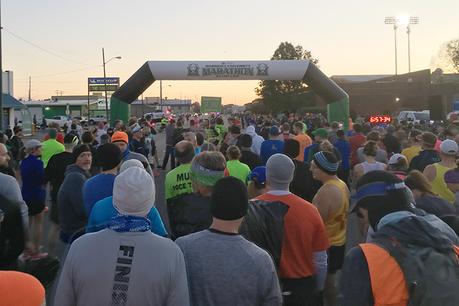
Temperatures still hovered around freezing as I joined the gathering crowd under the start arch on the north side of the stadium. The occasional thin, wispy cloud dotted the periphery of an otherwise clear and brightening sky. With temperatures rising above 30°F I’d decided not to wear tights, and a smart decision it turned out to be — I’d psyched myself up for such intense cold that by the time I stepped outside, it actually wasn’t so bad. My arm warmers, calf sleeves and gloves would provide plenty of warmth.
Unlike other similarly sized events, due to liability concerns (?) the MUM organizers offered no pre-race bag check for runners to drop off pants, jackets or other items at the start and retrieve them at the finish. And so rather than discard/donate my 2014 Mississippi Blues Marathon fleece pullover (because man, it’s useful on cold mornings like this), I folded and stashed it in the bushes behind a large rock emblazoned with the Marshall Thundering Herd logo in front of the Shewey Athletic Building. Given the limited police presence in the area, I was confident my trusty pullover would wait for me until my return. Ah, how I do love smaller marathons.
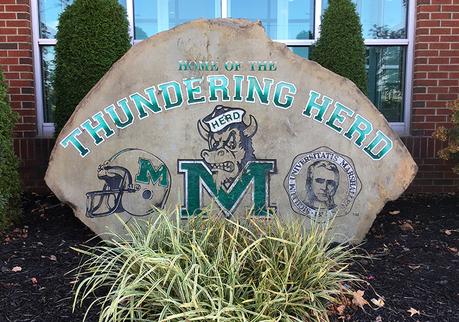
Ironically, though MUM is on the smaller size as urban marathons go, it’s actually the largest marathon in West Virginia with 372 finishers for the 2019 race. And it just so happens to fall on the same weekend as the world’s largest marathon, which takes place 600 miles away in New York City. In fact, seemingly all of my fellow runners I’d seen boarding flights in Los Angeles and Charlotte on Friday had in fact been heading to the Big Apple. You can imagine their bemusement on hearing I was also flying to a marathon… in West Virginia.
As a female singer performed the National Anthem, I sipped half of my 5-hour Energy and positioned myself in the start corral next to an anxious first-timer. I tried to help calm her jitters, assuring her the hardest part was behind her and that this was the fun part — once the gun went off, she’d be fine. We wished each other luck as Katy Perry belted out “Firework” over the PA system. I glanced at the official clock, seeing the red numbers hit “7:00:00” just as the start cannon boomed to signal the start of the 16th Marshall University Marathon.
The MUM course is a two-loop tour of Huntington, with the opening two miles tracing their own rectangular loop east of campus: out on 3rd Avenue and back on 5th with the two streets connected by a two-block stretch of (not yellow) brick road. Here I heard a RaceRaves shout-out alongside me and turned to greet Alexis Batausa, the super-cool race director for the nearby Hatfield McCoy Marathon which I’d run back in 2016. He informed me that he was training for his first 100-miler and told me how much he appreciated RaceRaves, before wishing me luck and pulling away en route to a 1:47:36 half marathon.
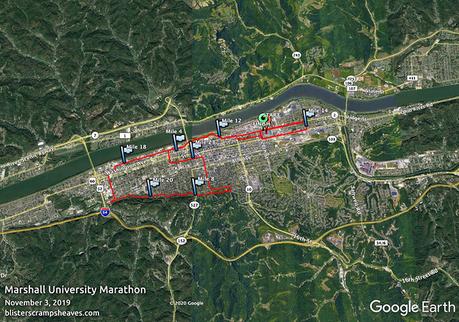
The morning air was cool, crisp and ideal for running as we (re-)passed the stadium, this time on 20th St with the main campus on our left. Turning west on 3rd Avenue, we soon reached Harris Riverfront Park where the neighboring state of Ohio beckoned from across its namesake river. (As the name of the Huntington Tri-State Airport suggests, Huntington sits at the junction of three states, across the river from Ohio and roughly ten miles from the Kentucky border.) Here the fog hung low on the water below the Robert C. Byrd Bridge, as if forming an ethereal crossing for otherworldly commuters to pass between Ohio and West Virginia.
The scene was peaceful and complemented my own relaxed gait. Given Marshall’s flat terrain and ideal weather, I’d chosen to break out my Nike Vaporfly 4% Flyknit shoes for the first time since Tokyo eight months earlier. The shoe’s springiness and reported ability to reduce recovery time would also be a boon with my next marathon coming up in state #30 in just three weeks.
I fell in comfortably with the 3:45 (3 hours, 45 minutes) pace group and adopted their time goal as my own, pausing twice for quick porta-potty pit stops. The group consisted of about ten runners with one fellow blasting “Somebody Told Me” by The Killers as a welcome distraction.
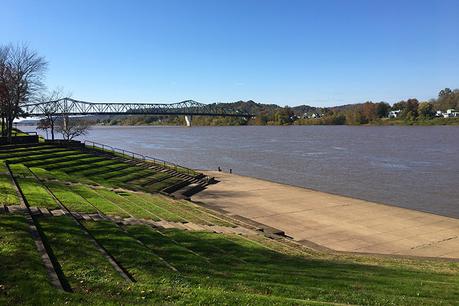
Soon we passed a shadowy domicile that resembled an actual haunted house lifted from the pages of an Edgar Allan Poe story. Unfortunately I didn’t get a photo, but the place was straight up spooky without the benefit of a single Halloween decoration.
The 2½-mile stretch out to Kiwanis Park was dominated by auto dealerships, blue-collar industries and the ghosts of businesses past, including several antique shops and a seemingly deserted box & lumber company. Timeworn mechanical equipment sat abandoned on unkempt lots overtaken by weeds and guarded by weathered chain-link fences. Towering silos dotted the landscape along with houses in various states of disrepair. And though I presumed coal to be the leading industry here, I saw no obvious signs, not that a city boy from the West Coast would necessarily know what to look for. One of my Lyft drivers had mentioned that a steel mill had employed many of the townspeople until its recent closing.
Huntington felt — gritty may not be the right word, but definitely like a throwback to an earlier, less hurried time. Yellowing store signs sported old-fashioned lettering while marquees stood neglected, their manually replaceable letters succumbing to time and exposure as though not changed since the Reagan administration. And I recalled the Urban Dictionary’s non-sugarcoated description of Huntington as “the Detroit of West Virginia” and “a city that was once a decent place to live… about 30 years ago.”
In mile 7 we reached Kiwanis Park and transitioned to a comfortable crushed limestone trail that ran beside a slow-moving creek. Here the grass looked oddly frosted as if decorated for Christmas; whether this was intentional or a sleight of hand by Mother Nature (powdery mildew, maybe?), I couldn’t say.
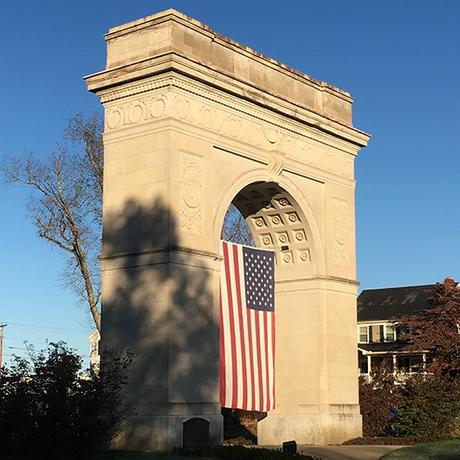
Leaving tiny Kiwanis Park we passed the imposing Cabell County Memorial Arch, a 42-foot-tall limestone and granite memorial to those who fought in World War One. We then continued along the trail for another 1¼ miles before reaching Ritter Park, which struck me as larger and more impressive than Kiwanis with benches, picnic tables and even tennis courts. Both parks dazzled with an autumn display of greens, oranges, yellows and reds, providing a welcome change of scenery from the city’s commercial and industrial sectors. And across the street from Ritter Park, multi-level homes like nothing I’d seen in Huntington boasted clean red-brick facades with white trim, white pillars and spacious, nicely manicured lawns.
The sun climbed ever higher in a brilliant, cloudless blue sky, providing a hint of warmth as we left Ritter Park behind and navigated through attractive residential neighborhoods sprinkled with businesses and churches. The transition from residential to commercial in mile 11 signaled our approach of downtown Huntington. After retracing our steps through Harris Riverfront Park, we crossed the Marshall campus on tree-lined walkways, circling Memorial Fountain and passing the recreation center en route to completing our first loop. 13.1 down, 13.1 to go.
First, though, a word on Marshall and Memorial Fountain…
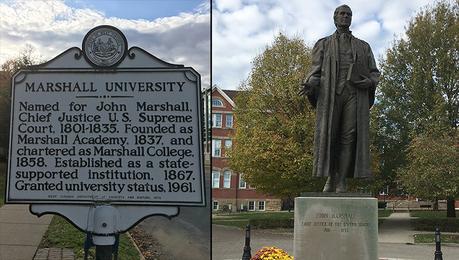
We Are Marshall
Established in 1837 and named for John Marshall, the fourth Chief Justice of the United States, Marshall University’s history is a storied one. Unfortunately, its most widely publicized chapter is one it would just as soon erase from the history books.
In 1970, six days before I was born, a chartered commercial jet carrying most of the Marshall University football team as well as coaches, fans and supporters crashed into a nearby hillside, killing all 75 passengers in what has been labeled “the worst sports-related air tragedy in U.S. history.” Memorial Fountain was dedicated in 1972 to the memory of the victims, and each year on the anniversary of the crash, the Marshall Student Government Association conducts a service on campus to memorialize and honor the 75 lives lost, with the water in Memorial Fountain being turned off during the service and not started again until spring. The tragic accident and its aftermath were chronicled in the 2006 film We Are Marshall starring Matthew McConaughey.
Soon we would have our own chance to honor the victims of the 1970 crash. But before that could happen, there was work to be done.
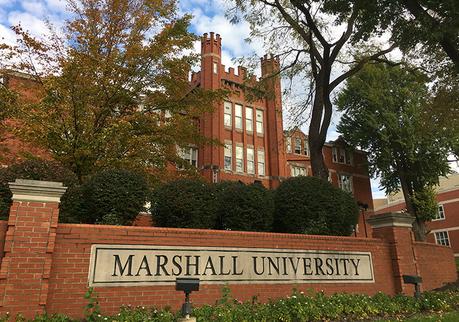
The second loop started in the opposite direction as the first as we headed out on 5th Ave and back on 3rd Ave, so that we were now forced to tackle the brick road connecting the two streets in the uphill direction. Luckily I was able to snag my bottle of Maurten from the friendly volunteers at the mile 14 aid station where I’d left it earlier that morning. And with that, loop two was off to a good start.
As if the organizers weren’t wicked enough making us pass close enough to the stadium at the midway point to hear the PA announcer inside welcome half marathoners across the finish, our reverse mini-loop to start the second half meant we’d run right past the stadium entrance where half marathoners coming from the opposite direction turned in for their triumphant finish. In my bitterness, I almost expected to look up and see volunteers tempting us with marathon finisher medals the way a matador would a bull with his red cape.
I pulled ahead of the 3:45 pace group to start the second half, hopefully for good though I knew they’d never be far behind. I was feeling strong and confident, even entertaining the possibility of a negative split (that is, a second half faster than the first), a feat I’d only accomplished twice in 41 marathons and each time at my hometown Los Angeles Marathon.
Per my usual marathon MO, I bypassed all the aid stations at MUM and ate nothing, relying instead on my strategically placed bottle of Maurten to fuel me happily and consistently. From miles 14–23 I took a swig every mile except 18, when I chose to down the rest of the 5-hour Energy shot I’d opened at the start line. Thing is, I’ve yet to master drinking on the run, and so I ended up clumsily splashing much of it on my face like caffeinated aftershave.
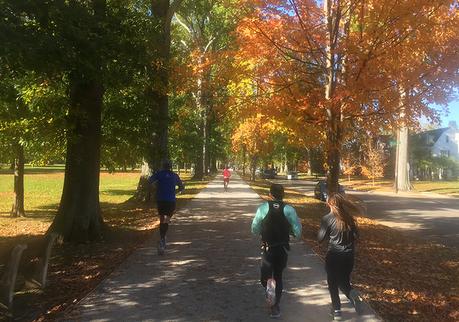
Aside from volunteers the course featured few spectators, nor much in the way of musical entertainment aside from a drummer dressed as a cannibal (?) near Riverfront Park and a quartet of whimsical woodwinds playing the Rocky theme at an almost apologetic volume in Ritter Park. And the only upside (if you could call it that) to Katie’s absence was that I could focus solely on running without the distraction of keeping an eye out for her along the course.
I’m not a fan of multi-loop courses and so tend to avoid them when possible; however, the scenery in Huntington was diverse enough to keep things interesting. And though the earth may not be flat (RIP “Mad” Mike Hughes), you could be forgiven for thinking so based on the MUM course, which is largely flat with only two or three short hills per loop, none of which will knock the wind out of you. After one such hill, we were rewarded with the delightful aroma of freshly baked bread wafting from a bakery directly ahead of us. Too bad there was no one handing out free samples, not that I needed a ball of dough expanding in my stomach at mile 19 of a marathon.
Our second tour of Kiwanis Park and Ritter Park was a been there, seen that, head down, stay the course effort as I focused on staying strong while ignoring everything but the back of the fellow ahead of me, whom I was now using as an impromptu pacer. Mile 20 passed, then 21, then 22 (with a brief stop for an inflatable Minion) as we circled Ritter Park and exited for the final time on our way back to Marshall.
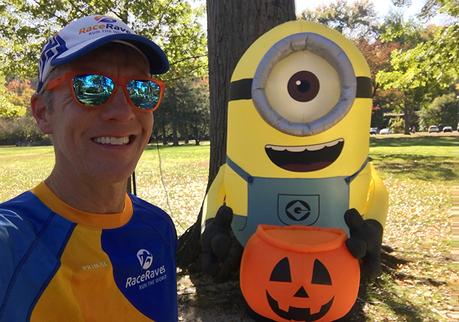
Still I felt good, felt relaxed, with strong stretches where I passed several runners, some of whom were clearly starting to fade. And I kept reminding myself that I just needed to reach the mile 25 marker, recalling from the first loop that mile 26 would start on a downhill. Hopefully from there I’d still have enough steam to push the pace to the finish.
I could feel myself starting to sweat for the first time in mile 25 as the sun approached its zenith. As we ran alongside the flood wall that separated us from Harris Riverfront Park and which was constructed after the historic Ohio River flood of 1937, I heard my name shouted by a pacer headed in the opposite direction. I even thought that pacer sounded like my buddy Dale B, a RaceRaves member and fellow 50 Stater whom I’d first met in Fargo six months earlier. Unfortunately, I hadn’t realized Dale (who lives in nearby Kentucky) would be in Huntington, and by the time his voice registered in my sluggish, marathon-soaked brain, the moment to acknowledge his shout-out had passed. Dammit. So instead I soldiered on, determined above all else to keep the 3:45 pacer behind me, wherever he was.
At last we reached the long-awaited mile 25 marker. Here I passed a few happy-go-lucky half marathoners on the gentle downhill before turning into Marshall for the home stretch. As we stepped onto campus, we were handed two white flowers which we then placed on Memorial Fountain as we passed, in honor of the 75 lives lost in the 1970 airline crash. (NOTE: If you do run MUM, be sure to hold each flower at the top of the stem near the base of the flower — at a running pace the long stems can easily fail under the weight of the flower, as confirmed by the trail of fallen white flowers leading up to the fountain. And trust me, in mile 26 the last thing you want to be doing is backtracking to pick up something you dropped, even something as meaningful as those flowers.)
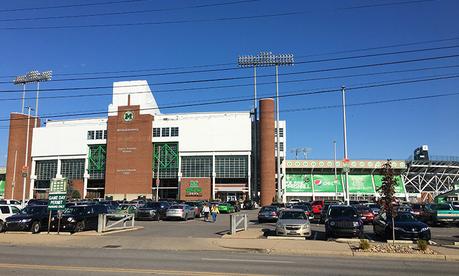
As mile 26s go this one was truly enjoyable, starting on the downhill before crossing Marshall’s historic red-brick campus and emerging with our final destination directly ahead of us in Joan C. Edwards Stadium. Glancing to my right as we turned onto 20th Street, I glimpsed the 3:45 pacer in my peripheral vision — he was now running alone and closing the gap on me. No no no, not now. Like a cowboy’s spurs in my flank, that was my cue to dig deep and finish strong. I had to stay ahead of him, had to leave no room for doubt since I didn’t know how close he was to his (and my) goal time. (Call it superstition, but I prefer not to consult my Garmin late in marathons because why bother? It’s not like I was holding back and waiting for the right moment to kick it up a notch.)
Circling the stadium, we passed the mile 26 marker before turning into the service entrance that led onto the field. As if seeing the finish line ahead weren’t enough of a highlight, volunteers handed each runner a football to carry the last 140 yards to the finish in a U-shaped path — end zone to the opposite 30-yard line, then back to the end zone — flanked by 75 American flags representing the lives lost in the 1970 crash. Here I imagined myself kicking in the afterburners as I accelerated ever so slightly, just in case there were any pro scouts among the dozen or so spectators watching from the stadium’s 30,000+ seats.
Hearing my name announced over the PA, I channeled my inner Randy Moss (the Thundering Herd’s most famous football alum), stiff-arming imaginary defenders and finding the end zone in an official time of 3:44:47. Despite missing a negative split by one minute, I’d beaten both my goal and the 3:45 pacer, who finished seconds behind me in an impressive show of spot-on pacing. Props to the MUM team on saving the best for last with their memorable finish on the field.
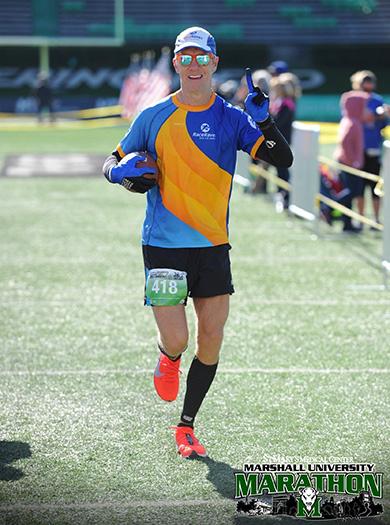
Say goodbye to Huntington
For you trivia buffs scoring at home, my MUM finish meant that within six months I’d conquered my own “Bison Double,” completing both US marathons that finish inside the home stadium of a team with a bison mascot (eat your heart out, Ken Jennings!). If only I’d planned better, I might also have run the Memorial Day BOLDERBoulder 10K which finishes on Folsom Field, home of the University of Colorado Buffaloes.
(And still more college sports trivia: With 114 wins and only 25 losses, Marshall boasted the winningest football program in America during the decade of the 1990’s. No bull!)
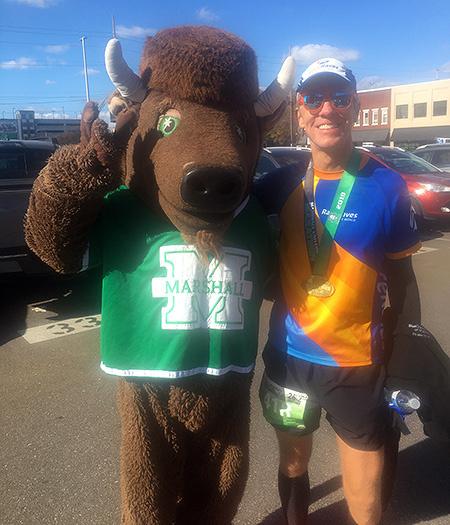
I returned the football, deferring my NFL dreams to another day, and gratefully accepted my finisher medal, an unassuming bronze football with a green and black ribbon that’s much more attractive than the medal itself. Then I collapsed on the field, where I found myself singing along to “Poison” by Bell Biv DeVoe (when had I last heard that song?) as I cheered other runners across the finish, some of whom chose to leave the football moves to us swole beefcakes.
There I lay savoring the soft, synthetic grass beneath my limp body. Eventually with a mighty effort, I willed myself to my feet (in part because I was getting cold) and reluctantly exited the stadium. My first stop was the Thundering Herd rock behind which my hidden fleece waited right where I’d left it. Have I mentioned I love smaller marathons? Then I grabbed some chocolate milk and a Krispy Kreme donut with Kelly green icing, which after two enthusiastic bites left me feeling like I’d need an insulin shot. (Curiously, Huntington has no Krispy Kreme but does have a Dunkin’ across the street from campus.) I also congratulated a fellow finisher who had run his first Comrades Marathon five months earlier and was predictably planning to go back in 2020 to earn his back-to-back medal. It’s a small world after all, and especially among runners.
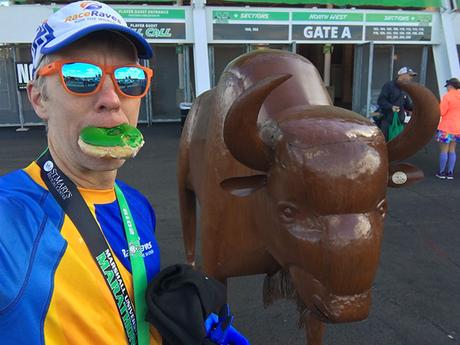
Then it was time to skedaddle, since I didn’t want to miss my afternoon flight home to Los Angeles via Charlotte. And it was only fitting that my request for a Lyft ride back to my hotel would be answered by — who else? Dan the Lyft Man! He even waited while I ran inside the Fairfield Inn & Suites, sponged off quickly, threw everything in my suitcase and checked out. In case you couldn’t tell, Dan will always be one of my fondest memories of Huntington.
Despite my lack of Katie, state 29 had been an unmitigated success. And as our plane gained altitude over Huntington, I gained perspective I’d missed by arriving under cover of darkness. From this aerial view I could better appreciate an industrial city and college town nestled between the sinuous Ohio River to the north and the vast Appalachian wilderness infiltrated by quiet country roads (and a red Chevy Sonic sporting the license plate “LYFT1”) to the south. And somewhere John Denver sang:
Country roads, take me home
To the place I belong.
West Virginia, mountain mama
Take me home, country roads.
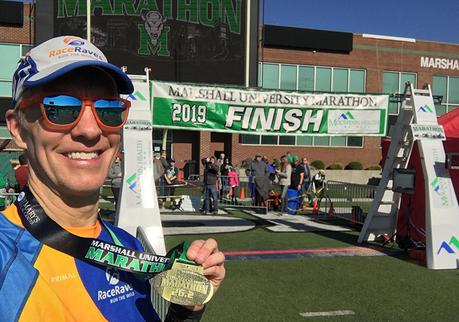
BOTTOM LINE: For a solid, few-frills race through the heart of urban Appalachia, MUM’s the word. Held annually on the same Sunday as the nation’s largest marathon in New York City, MUM is itself the largest marathon in West Virginia and a worthy late-season addition if you’re looking to conquer the Mountain State on your 50 States quest. As the name suggests, the centerpiece of race weekend is Marshall University, with the hands-down highlights of race day being 1) the opportunity in mile 26 to leave a white flower on Memorial Fountain to honor the 75 lives lost in the 1970 plane crash tragedy, and 2) the finish on the football field at Joan C. Edwards Stadium.
Aside from those two moments, MUM struggles to convey a distinctive personality or rise above the level of “good enough.” Located at the nexus of West Virginia, Ohio and Kentucky, Huntington isn’t exactly a tourist mecca, and what there is to see (aside from the Marshall campus) tends to be spread out across the city: a park here, a statue there, a small town square with shops and restaurants a stone’s throw from the Ohio River. And nary a grocery store to be found, though luckily I was able to score a peanut butter and jelly sandwich (my pre-race breakfast) at the local Speedway convenience store. All this civic distancing was particularly inconvenient for me since I’d registered too late to score a room at one of the two conveniently located hotels near campus (my bad), and so I ended up staying atop a hill nearly four miles away at the Fairfield Inn & Suites by Marriott.
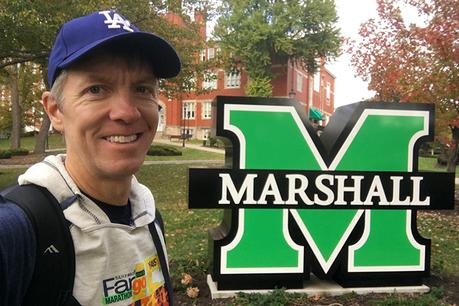
With that in mind, if you do decide to run MUM I’d suggest you a) book accommodations early (though even the closest hotels are more than a mile from the race start/finish) and b) rent a car, because Lyft/Uber rides can be sporadic and tough to come by. (This is especially pronounced if you’re coming from a larger city like Los Angeles, where you’ve been spoiled by a surfeit of rides and short wait times.) In fact, in Huntington the same Lyft driver picked me up four times in a row and drove in from the next county to do so. So I spent a goodly amount of my 40+ hours in Huntington waiting for Lyft rides, though I knew when I saw my dedicated driver’s license plate (LYFT1) for the first time that I was in good hands. Thanks, Dan!
The TL;DR is that I did enjoy my MUM weekend — the course is largely flat (ironic since this is the Mountain State) and diverse enough to justify two loops. What’s more, the sunny weather but cooler temperatures were exactly what you wish for in a November marathon. The race organizers do rely heavily on the appeal of Marshall University to attract runners (it worked on me!), though there’s also enough to see around Huntington for curious minds (on active legs) to fill a Saturday. All that said, unless you’re averse to running in the heat, I’d recommend the excellent Hatfield McCoy Marathon in June (which starts in Kentucky and finishes in West Virginia) as a more memorable choice for the Mountain State. And I’m not alone in that opinion, since MUM finished as runner-up to Hatfield McCoy for both the best marathon and best half marathon in the state in our RaceRaves Runners Choice polls.
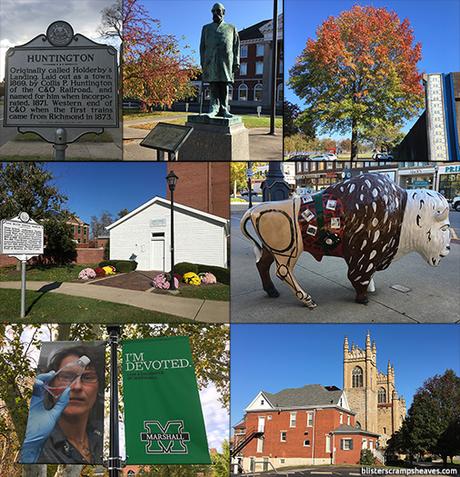
PRODUCTION: Race production on the whole went smoothly enough, though at the same time the weekend lacked a certain je ne sais quoi, that genuine sense of spirit and enthusiasm that distinguishes similarly sized races like Missoula, Jackson Hole and Clarence DeMar. As mentioned above, the organizers clearly count on the overarching presence of Marshall University to carry the day, from the Marshall-themed decorations at the pre-race expo to the finish on the field at Joan C. Edwards Stadium. (Disclaimer: While I’m a notorious sucker for college campuses and will always err on the side of the color green, the Marshall football team happened to be playing my alma mater Rice University in Houston on the Saturday of race weekend. That said, Rice so rarely wins that another predictable defeat didn’t color my feelings toward MUM.)
With the exception of Kiwanis Park, friendly volunteers were stationed at strategic points along the course, presumably to keep an eye on and direct the runners. I owe a particular debt of gratitude to the volunteers at the mile 2/14 aid station, who kindly allowed me to stash my bottle of Maurten at their table before the race, which I then claimed on the second loop. Oh, and kudos to the PA announcer whose welcoming voice on the field at Joan C. Edwards Stadium greeted runners as they crossed the end zone/finish line, many of them with football in hand. Near-freezing temperatures aside, I also appreciated the opportunity to lounge on the field for as long as I wanted afterward, an unexpected bonus and particularly when compared with another unnamed marathon happening that day in ew-Nay ork-Yay ity-Cay, where no sooner do you cross the finish line in Central Park than they kick you out the nearest exit.
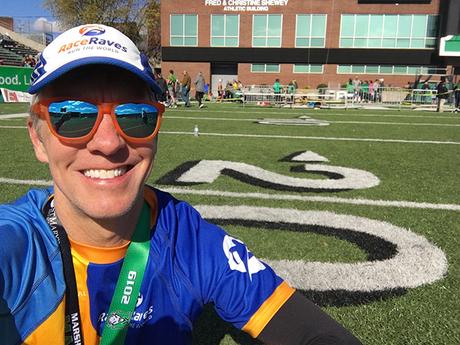
Outside the stadium, the reasonable post-race spread featured hot dogs, burgers, Krispy Kreme donuts with Kelly green icing, potato chips, bananas, Coke, chocolate milk and water, plus Bud Light and always unappealing Michelob Ultra. (On that note, I’d urge the social media “influencers” who now awkwardly endorse Michelob Ultra in my Instagram feed to reconsider; I’ve yet to meet a runner whose face lights up at the mention of Michelob Ultra.) Nearby, a vendor offered runners the chance to put their feet up (literally) and treat their weary legs to the latest in pneumatic compression recovery technology.
Small, quiet and lacking in energy, the pre-race expo was held more than a mile from campus at the New Baptist Church, a converted ice-skating rink where a fleet of cars sporting “FUNERAL” placards greeted us at the entrance. The expo itself consisted of packet pickup, a registration table, a couple of booths selling running supplies and local apparel, a drop-off point for non-perishable donations to the food pantry, and an oversized United States map with pushpins to indicate your state. Given its utilitarian format I got in and out relatively quickly, all the while wondering why this wasn’t being held for convenience sake on the Marshall campus.
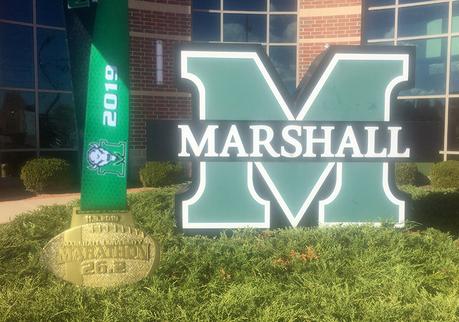
SWAG: The race shirt is a Kelly green Brooks tech tee, comfy though not as desirable as the stylish pullover that had been offered to registrants several months earlier. (With MUM now in its 17th year, I’d urge the organizers to follow the lead of other events and better anticipate participant numbers so that the pullover option remains available after the current July 1 registration cutoff.) The finisher medal is an understated bronze football with an attractive green and black ribbon, while Goodr sunglasses emblazoned with footballs and the Marshall University logo (never again to be worn by this Rice alum, go Owls!) rounded out the swag.
Updated 50 States Map:
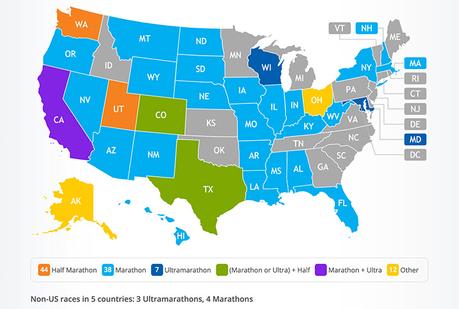
RaceRaves rating:
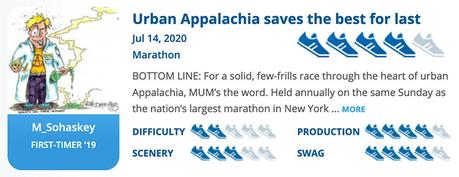
FINAL STATS:
Nov 3, 2019 (start time 7:00 am, sunrise 6:56 am)
26.24 miles in Huntington, WV (state 29 of 50)
Finish time & pace: 3:44:47 (first time running MUM), 8:35/mile
Finish place: 86 overall, 9/31 in M 45-49 age group
Number of finishers: 372 (229 men, 143 women)
Race weather: clear & cold (31°F) at the start, partly cloudy & cold at the finish
Elevation change (Garmin Connect): 240 ft gain, 237 ft loss
Elevation min, max: 513 ft, 565 ft
